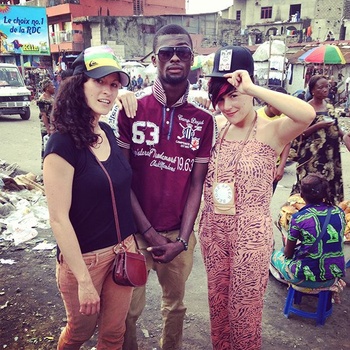With a distinctive blend of the influences that have fed into the music and dances currently popular in Kinshasa, Ula Sickle, along with three young virtuoso performers and a female DJ-musician, has her own take on globalised culture.
Kinshasa is a constantly changing megalopolis in the heart of Africa, whose culture very much reflects globalisation. Ula Sickle, a Canadian choreographer who lives in Brussels, plunged into the Congolese cauldron to create two solo pieces back in 2010 and 2012. She returned there for Kinshasa Electric, danced by three young Congolese – Joel Tenda, Popol Amisi, and Jeannot Kumbonyeki – to a score by Daniela Bershan alias Baba Electronica. Rooted in the music and dance of Kin nightlife and in the full range of local variations on world pop culture, the show they have come up with is organic and energetic, a fascinating reflection of the sounds and movements of our time.
Where did the idea for Kinshasa Electric come from?
Ula Sickle: Most of my performances take people and their personal histories as their starting point. In 2010 and 2011, I created two solos with female Kinshasa dancers and I felt I could go further. I wanted to work with a group of dancers whom I knew. In those two shows, the soundtrack was very minimalist, almost abstract: I had worked by eliminating layer after layer. This time, I wanted to work on something more concrete. And for that, I invited Daniela to join me in Kinshasa to develop the project with me and with the dancers.
What was your first impression when you arrived in Kinshasa?
Daniela Bershan: It is a totally different sound culture. For the first two days, I was overwhelmed by the sound of the people, the cars, and the motor-bikes, combined with a very rich musical culture. I was surprised by just how vibrant and inventive the music scene was. Maybe people don’t travel much, but sound travels all the time, making return journeys to other African capitals, Europe, and the USA.
Sickle: It’s interesting to see that music and dance styles travel in very similar ways. On the dance floors of the night clubs, hip-hop moves are combined with dance styles from Angola and Tanzania. It’s strange, too, to see how certain dances are linked to social and political events, incorporating some very simple little gestures that have a global media impact. The Guantanamo Dance and the Birdflu Dance were enormously popular.
The mix of all those reciprocal influences creates a break with the image of Kinshasa as a former colonial city in Africa. The context is now globalised.
Bershan: I arrived in a city where everyone talks French, whereas mine is very limited. But we recognised each other immediately by certain dress codes. The way of dancing and talking and the way of dressing are connected to pop culture, while still reflecting the period and place you live in. Today, the kinois are very much aware of what is going on in Brussels, Paris, New York, and LA. In a sampled world, what does creating something that belongs to you mean? Is it you who makes a sample or the sample that makes you?
Sickle: We haven’t made any judgement on this globalised pop culture. We didn’t criticise it: we immersed ourselves in it. If you approach globalised culture with a negative outlook, the only response is to resist. For our part, we saw it as a raw material.
KINSHASA ELECTRIC • 15, 17 & 18/5, 20.30, 16/5, 22.00, €12/16, KVS_BOX, Arduinkaai 9 quai aux Pierres de Taille, Brussel/Bruxelles, 02-210.11.12, www.kvs.be, www.kunstenfestivaldesarts.be

Fijn dat je wil reageren. Wie reageert, gaat akkoord met onze huisregels. Hoe reageren via Disqus? Een woordje uitleg.